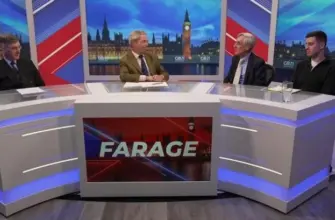## Global Markets Plunge Amid Trade War Escalation
Financial markets worldwide experienced a sharp downturn as Asian and European stock exchanges plummeted, echoing past periods of market instability. The immediate catalyst for this turbulence was the recent announcement of new tariffs imposed by the United States.
President Trump has doubled down on his trade policies, dismissing concerns about potential economic repercussions. In posts to his social media platform, Truth Social, he stated, “Oil prices are down…there is no Inflation.”
“Oil prices are down, interest rates are down (the slow moving Fed should cut rates!), food prices are down, there is NO INFLATION, and the long time abused USA is bringing in Billions of Dollars a week from the abusing countries on Tariffs that are already in place.”
The tariffs have particularly targeted China, which President Trump labeled “the biggest abuser of them all.” Beijing responded swiftly with its own retaliatory measures, announcing new tariffs totaling 34% on US imports starting April 10th. China has also indicated it will pursue legal action against the United States through the World Trade Organization and is considering restricting exports of rare earth elements—critical components in high-end medical and electronic technologies.
A spokesperson for Beijing criticized the American actions as “typical unilateralism and protectionism, and economic bullying,” adding that US tariffs disproportionately benefit America at the expense of other nations. They stated: “Threats and pressure are not the right way to deal with us.”
Trump’s Strategy: Re-Negotiation & Onshoring
President Trump, a real estate magnate and businessman, maintains that these tariffs will compel nations to renegotiate trade deals and encourage companies to relocate manufacturing operations to the United States.
“ONLY THE WEAK WILL FAIL!”
He expressed confidence that “Big business is not worried about the Tariffs, because they know they are here to stay.”
Economic Concerns & Federal Reserve Response
Federal Reserve Chair Jerome Powell cautioned that increased tariffs are likely to fuel inflation and slow economic growth, creating an “elevated” risk of unemployment. He noted the expected impact will be “significantly larger than expected.” Powell stated it was “too soon” to consider adjustments to current monetary policy.
President Trump has publicly urged Powell to immediately lower interest rates, accusing him of political maneuvering and criticizing his perceived lack of responsiveness. In a series of capitalized posts, he demanded: “CUT INTEREST RATES, JEROME, AND STOP PLAYING POLITICS!”
Despite this pressure, reports suggest the Federal Reserve is not prepared to alter lending rates from their current range of 4.25% to 4.5%, even as inflation gradually moves towards the Fed’s target of 2%.
Market Reactions Across Asia and Europe
The impact on global markets was substantial:
- European stock markets experienced significant declines, with Paris losing over six percent, London nearly six percent, Amsterdam and Oslo shedding more than five percent each, and Milan down by over three percent.
- Asian markets also suffered heavy losses, prompting temporary trading halts in Japan and Taiwan as investors rushed to sell off assets.
- In Japan, the Nikkei 225 futures product triggered a “circuit breaker” – a 10-minute pause in trading – after falling more than eight percent.
- The Bombay Stock Exchange (India) saw a steep drop with the Sensex and Nifty indices plummeting approximately five percent. The Sensex lost 3,939.68 points to 71,425.01, while the Nifty dropped 1,160.8 points to 21,743.65.
- This market downturn reportedly erased over Rs 20.16 lakh crore (approximately $243 billion) in investor wealth.
President Trump characterized China’s response as “panicking,” claiming it was a reaction they “cannot afford to do.”



